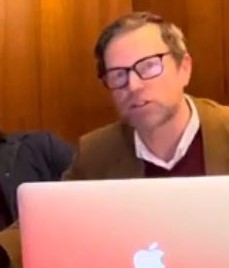PM's Presser: UN, A NZ Mercenary & TV In Parlt.
By Kevin List
In this
edition:
United Nations Report on Seabed
and Foreshore Legislation
New Zealander
Captured by Rebel Forces in Africa
More
Parliament on the Small Screen
United Nations Report on Seabed and Foreshore Legislation
A United Nations committee took a moderately but not excessively dim view of New Zealand's, 'Seabed and Foreshore' legislation. The Prime Minister re-jigged last years arguments to defend the legislation.
"The legislation itself provides for a process of negotiation to enable customary interests to be established," she said.
When further pressed on the timidly scathing report from the United Nations, the Prime Minister alluded to the National Party's views regarding the often-criticised legislation - that it was in fact discriminatory – to non-Maori.
"Some might well argue that the legislation itself is discriminatory in that clearly the customary interests are likely to be established for Maori and not for anyone else."
Fortunately for the Prime Minister, the Howard government's attitude to Australia's indigenous population was so dismal that their report card from the United Nations had contained some rather more robust language.
"It [the UN body] has used nothing like the kind of language that was used when it looked at a matter concerning Australia six years ago," stated the Prime Minister.
New Zealander Captured by Rebel Forces in Africa
The discovery that a New Zealander had become involved in a rather tricky situation in Africa had just reached the Prime Minister. The New Zealander, Brian Sands had been captured by rebel forces in the Ivory Coast. The Prime Minister outlined the situation as it stood at 4pm on Monday
"I'm told that the person involved does have a New Zealand passport. We have no direct consular representation in the Ivory Coast. Consular assistance there is extended to our nationals through the British Embassy. The Ministry of Foreign Affairs and Trade here has contacted the Foreign and Commonwealth Office and the British Ambassador will be asked to make further inquiries on behalf of New Zealand. I've also seen reports in the media that the rebels may execute the person as a government spy. We've passed that information on to the foreign and commonwealth office. If media sources have any additional information then it would be really helpful to hear [it]."
Later that evening on TVNZ's 'Close Up' the Minister of Foreign Affairs, Phil Goff alluded to the fact that the man involved, and alleged by rebel forces to be a 'mercenary', may have 'mental health issues.' Any claims that the man had served in the New Zealand military appeared to be false according to the New Zealand Defence Force.
More Parliament on the Small Screen
The Prime Minister was of the opinion that the changes to the way Parliament is broadcast would be good for "direct democracy" and seemed mystified that there was unease from the Commonwealth Press Union and TV3.
"My understanding all along has been that the Government was asked to respond to a unanimous decision of the standing orders committee," she said.
Given that no television stations normally show MP's falling asleep or eating burgers the controversy was a dead issue for the Prime Minister.
"If you wanted to censor what the public saw, you wouldn't have the cameras in there at all. I think it is Parliament opening itself up to a great deal more scrutiny."
It would appear that the issue of television broadcasting was a dead issue for almost all MP's except Rodney Hide. Mr Hide seemed to consider that the broadcasting changes would somehow see New Zealand parliamentary coverage descend to the level of North Korea. The Prime Minister considered the coverage would more likely resemble a nation a little closer to New Zealand.
"I understand that what they [the standing orders committee that recommended the changes] came up with in essence is what happens in the Australian Parliament," she said.



 Martin LeFevre - Meditations: What Being “Inward Looking” Really Means
Martin LeFevre - Meditations: What Being “Inward Looking” Really Means Binoy Kampmark: Blinken Atrocious In A Dangerous World
Binoy Kampmark: Blinken Atrocious In A Dangerous World Jim Mikoz: Look Out Rocks … Oops Too Late
Jim Mikoz: Look Out Rocks … Oops Too Late Peter Dunne: Dunne’s Weekly - National And Labour Combine To Shut Out Greens
Peter Dunne: Dunne’s Weekly - National And Labour Combine To Shut Out Greens Ramzy Baroud: Voting Against Genocide - How Gaza Defeated The Democratic Establishment
Ramzy Baroud: Voting Against Genocide - How Gaza Defeated The Democratic Establishment  Alastair Thompson: Google's Support For Democracy And Media In NZ | Part 2
Alastair Thompson: Google's Support For Democracy And Media In NZ | Part 2